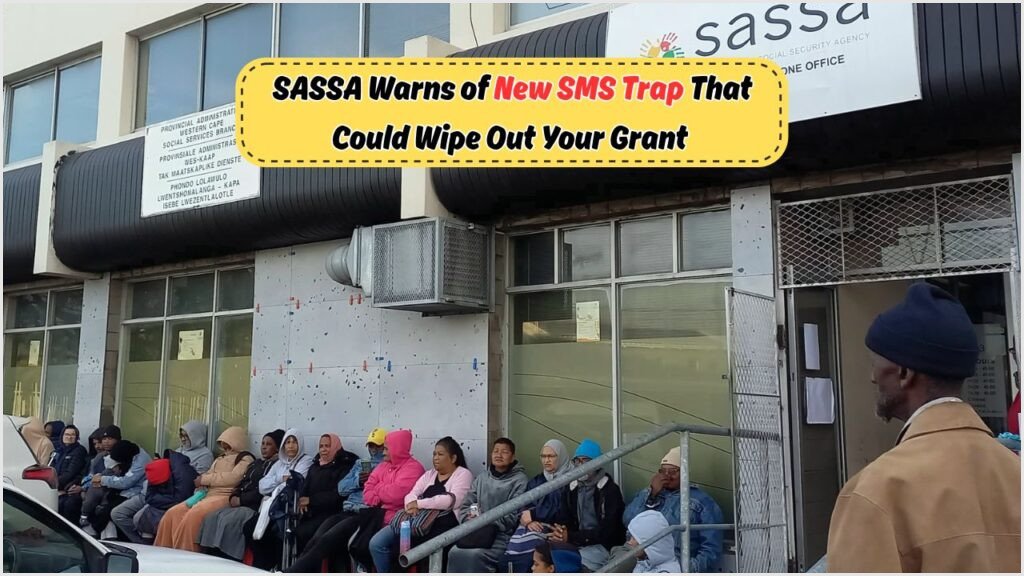Fake SASSA SMS Links: The rapidly circulating fake SASSA SMS links pose a significant threat to grant beneficiaries in South Africa. These scams aim to deceive recipients by mimicking official communication from the South African Social Security Agency (SASSA), potentially leading to financial loss and identity theft. With the increasing reliance on digital communication, it becomes crucial to differentiate between genuine and fraudulent messages. Understanding the tactics used by scammers and being aware of the telltale signs of fake messages can protect your grant and personal information from being compromised.
Identifying Fake SASSA SMS Links and Protecting Yourself
In the digital age, the spread of fake SASSA SMS links is alarmingly rapid, and it’s essential to know how to identify these scams. Fraudsters often use tactics such as:
- Impersonating official SASSA numbers
- Using urgent language to prompt quick action
- Providing links that redirect to phishing websites
- Requesting personal or financial information
- Offering unrealistic promises of additional grants
- Threatening withdrawal of benefits
- Exploiting current events or crises to add legitimacy
Steps to Verify Authenticity of SASSA Communications
Verifying the authenticity of SASSA communications can safeguard you from falling victim to scams. Here are essential steps to ensure your security:
| Action | Description | Why It Matters | Example |
|---|---|---|---|
| Check sender’s details | Verify the SMS sender’s number against official SASSA contacts. | Ensures the message is from a legitimate source. | Official SASSA numbers are listed on their website. |
| Examine the URL | Hover over links to preview the URL and check for legitimacy. | Prevents redirection to phishing sites. | Legitimate URLs typically end with .gov.za |
| Look for errors | Check for spelling and grammatical errors within the message. | Scammers often make mistakes in their messages. | Errors in official communication are rare. |
| Contact SASSA | Reach out to SASSA directly to confirm message authenticity. | Provides confirmation from the source. | Use official contact methods only. |
| Report scams | Inform SASSA or authorities about the suspicious message. | Helps prevent others from being scammed. | Use the SASSA fraud line. |
| Stay informed | Follow SASSA updates through official channels. | Keeps you aware of current scams and alerts. | Subscribe to official SASSA newsletters. |
Understanding the Risks of Falling for Fake SASSA SMS Links
Falling for fake SASSA SMS links can have severe consequences, both financially and personally. Scammers aim to extract personal and financial information, which can lead to identity theft and unauthorized access to grant funds. The impact of such scams may include:
Loss of Funds: Fraudsters may empty your bank accounts once they gain access to your financial details.
- Unauthorized transactions
- Difficulty in recovering stolen funds
- Potential overdraft fees
Identity Theft: Scammers can use your personal information to create fake identities, leading to:
- Fraudulent loan applications
- Damage to credit score
- Legal complications
Emotional Distress: The realization of being scammed can cause significant stress and anxiety, affecting mental health and well-being.
- Distrust in digital communication
- Fear of future scams
- Increased vigilance impacting daily life
How SASSA is Combating Fake SMS Scams
SASSA is actively working to combat fake SMS scams to protect beneficiaries. Their comprehensive approach includes:
| Method | Description | Impact |
|---|---|---|
| Public Awareness Campaigns | Educating the public about identifying scams and protecting personal information. | Reduces the number of successful scams. |
| Collaboration with Authorities | Working with law enforcement to track and apprehend scammers. | Leads to the prosecution of fraudsters. |
| Technological Enhancements | Implementing advanced security measures in their communication systems. | Ensures secure and reliable communication channels. |
| Feedback Channels | Providing platforms for beneficiaries to report suspicious messages. | Helps in immediate action against new scams. |
| Regular Updates | Keeping beneficiaries informed about the latest scam tactics. | Maintains a well-informed public. |
| Official Communication Verification | Encouraging beneficiaries to verify any suspicious communication directly with SASSA. | Prevents unauthorized access to personal information. |
Steps to Take if You’ve Fallen Victim to a Fake SASSA SMS Link
If you suspect you’ve fallen victim to a fake SASSA SMS link, immediate action can mitigate the damage. Here are steps to follow:
Contact Your Bank: Notify your bank to freeze your accounts and monitor for unauthorized transactions.
- Request a transaction review
- Change your online banking credentials
- Consider additional security measures
Report to SASSA: Inform SASSA about the scam and provide details of the fraudulent message.
- Use official contact methods
- Share the scam message for tracking
- Seek guidance on further steps
File a Police Report: Reporting to the local police can help in the investigation and prevention of similar scams.
- Provide all relevant information
- Retain a copy of the report
- Follow up on the investigation
Ongoing Efforts to Educate and Safeguard Beneficiaries
Continuous efforts are being made to educate and safeguard beneficiaries against fake SASSA SMS links. These efforts include public seminars, online resources, and community outreach programs aimed at increasing awareness and providing resources for protection. By participating in these initiatives, beneficiaries can gain valuable knowledge on how to avoid scams and protect their grants effectively.
| Resource | Description | Access | Impact |
|---|---|---|---|
| Public Seminars | In-person sessions educating on scam awareness and prevention. | Local community centers | Increased awareness and prevention |
| Online Resources | Guides and tutorials on recognizing and reporting scams. | Official SASSA website | Easy access to information |
| Community Outreach | Programs aimed at reaching vulnerable populations. | Rural and urban areas | Broader protection coverage |
| Helplines | Dedicated lines for reporting and inquiry about scams. | Contact through SASSA’s official site | Immediate assistance available |
| Newsletters | Regular updates on new scams and protective measures. | Email subscription | Current information dissemination |
| Workshops | Interactive sessions on digital security practices. | Various locations | Practical learning experience |
FAQ Section
How can I identify a fake SASSA SMS link?
Check for unusual sender numbers, grammatical errors, and suspicious links. Always verify with official SASSA channels.
What should I do if I receive a suspicious SMS?
Do not click on any links and report the message to SASSA through their official contact methods.
Can SASSA retrieve my lost funds?
Unfortunately, SASSA cannot retrieve funds lost to scams. It’s crucial to act quickly with your bank.
Are all official SASSA communications via SMS?
No, SASSA also uses emails and official letters. Verify any communication via their official website.
What measures are in place to prevent SMS scams?
SASSA is enhancing security measures, running awareness campaigns, and collaborating with authorities to combat scams.
How can individuals safeguard their SASSA grants from fraudulent SMS links?
Avoid clicking suspicious links, verify authenticity with official sources.





